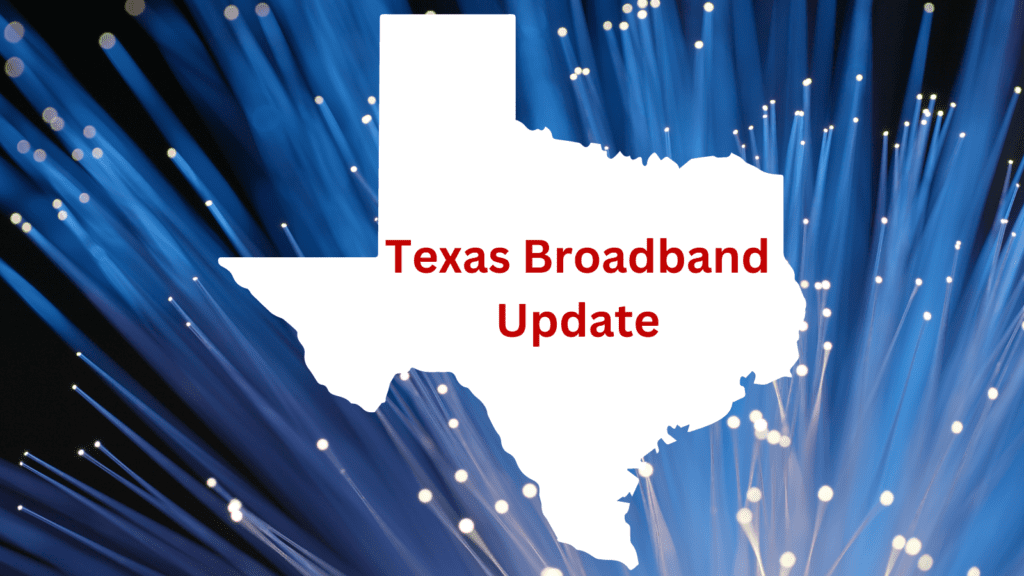
Return to February 2024 newsletter
Comptroller update: Broadband expansion in Texas
By The Honorable Glenn Hegar
Texas Comptroller of Public Accounts
In 2021, the 87th Texas Legislature established Texas’ first broadband office in the Texas Comptroller’s office to oversee the expansion of high-speed internet access statewide, particularly in rural areas. Since then, there hasn’t been an idle moment.
Full participation in modern society often requires high-speed internet, and the long-term health of the state and national economies depends on our rural-based industries getting connected. But expanding broadband access is a monumental task – one that requires collaboration and partnerships between local governments and private entities, across counties and among residents.
I’m proud to say the Texas Broadband Development Office (BDO) has reached significant milestones during these first years as it reaches out to communities and gauges public opinion, draws on stakeholder feedback to set long-term goals for broadband expansion and secures the funding necessary to make broadband-for-all a reality in Texas. Success doesn’t come easy when starting from scratch, but we have worked tirelessly to meet those challenges head on.
Federal Broadband Equity, Access, and Deployment (BEAD) Program
Last summer, the state was allocated $3.3 billion in federal funding from the national Broadband Equity Access and Deployment (BEAD) Program. Texas’ share was the largest of any state. Why? Because the challenge facing our state is unique: Texas has a large population with a significant share of unserved areas over a vast and geographically diverse landscape. Our state has lots of rural ground to cover, and the economic implications of connecting those areas to high-speed internet cannot be overstated.
Historically, Texas has typically been a donor state, meaning our tax dollars would go to Washington and then get sent out to fund projects in other states. So, it’s good to see our hard-earned tax dollars coming back to Texas, and you can be certain that each of those dollars will be spent wisely.
The federal government requires all states and territories under the BEAD Program to develop and submit an Initial Proposal to the National Telecommunications and Information Administration (NTIA) that outlines the steps they will take to pursue universal broadband service using the federal funding received. The BDO submitted Texas’ proposal to the NTIA in December and expects to have its BEAD-funded program up and running this year.
Bringing Online Opportunities to Texas (BOOT)
Texas received $500.5 million from the American Rescue Plan Act’s Capital Projects Fund, which the BDO is using to kickstart Texas’ first competitive broadband grant program – Bringing Online Opportunities to Texas (BOOT) – to fund infrastructure projects that bring broadband access to end users in eligible areas of the state.
Last spring, the BDO received grant applications from broadband service providers and political subdivisions for the BOOT Program’s first round of funding that made available $120 million, and it expects to finalize award decisions by March.
To be eligible for BOOT grants, broadband infrastructure projects must be designed to deliver, upon completion, broadband service that reliably meets or exceeds symmetrical speeds of 100 Mbps. Awarded applicants also must provide a universally available low-cost option for locations being serviced by the project and participate in any available federal broadband subsidy program.
The BDO is working to determine the optimal time to begin accepting applications for a second round of the BOOT Program.
Broadband Infrastructure Fund (BIF)
Last year’s legislative session can best be remembered for the colossal investmentsstatewide infrastructure, including broadband – made possible by an historic $32.7 billion state ending balance from the previous biennium. The 88th Legislature established, and Texas voters approved, the BIF with a $1.5 billion allocation to provide financial assistance for broadband and emergency telecommunications infrastructure projects in the state. Specifically, the BIF can be used to reimburse a portion of the costs to replace utility poles that deploy broadband service as well as upgrade the state’s 911 service to a more effective and efficient digital system referred to as Next Generation 911. In the future, the BIF could be used to support matching requirements for federal grants, help fund workforce development initiatives and create a middle mile program, which would aim to connect local broadband networks to larger regional and national networks.
These are only a few of the latest broadband updates. For more, I encourage you to sign up for the BDO’s monthly newsletter, or, if you have specific questions or comments about broadband programs affecting your community, please reach out to the BDO team directly by emailing broadband@cpa.texas.gov or calling 833-3-TEXBDO.
Thank you for reading and taking an interest in our work at the BDO.
May God bless you and the great state of Texas!
Glenn Hegar


